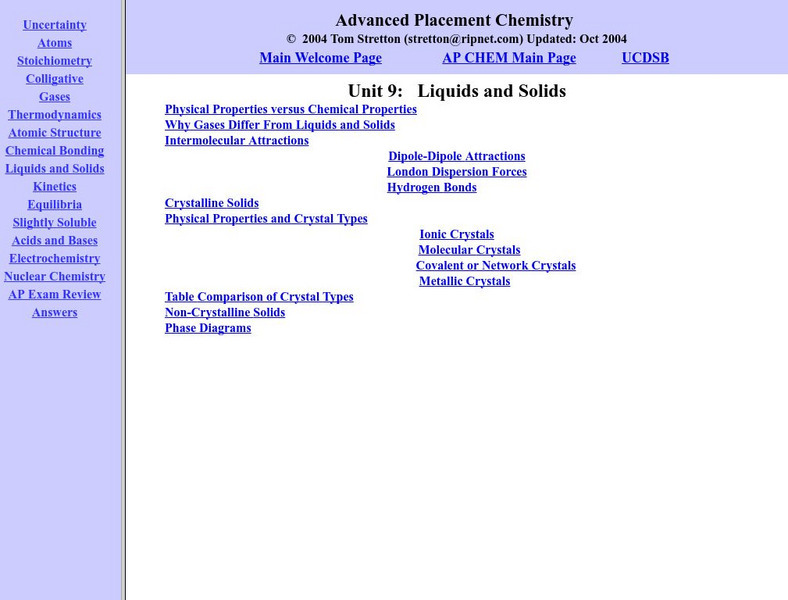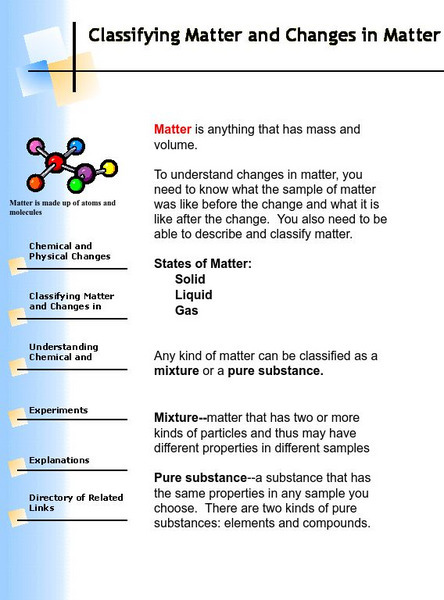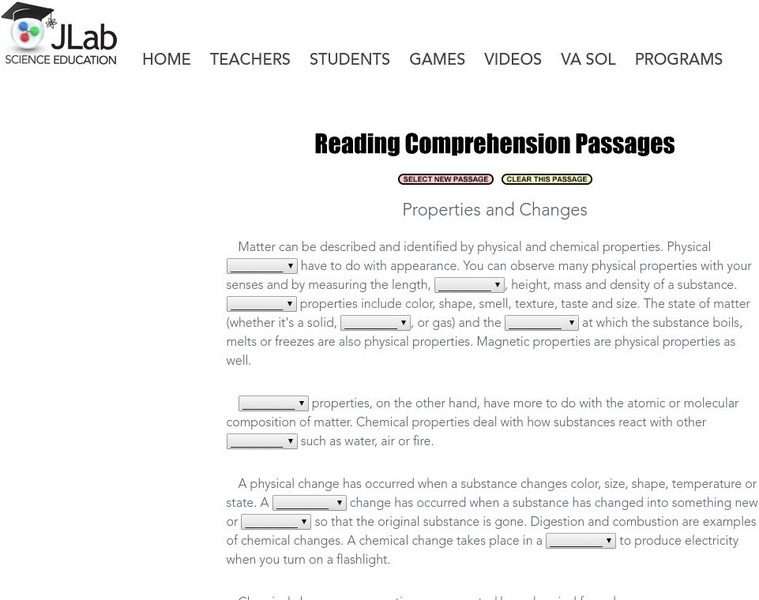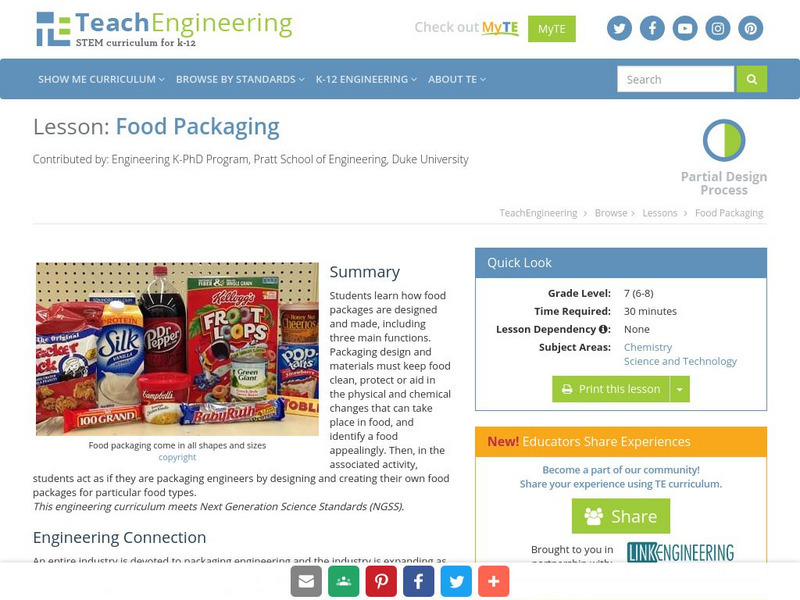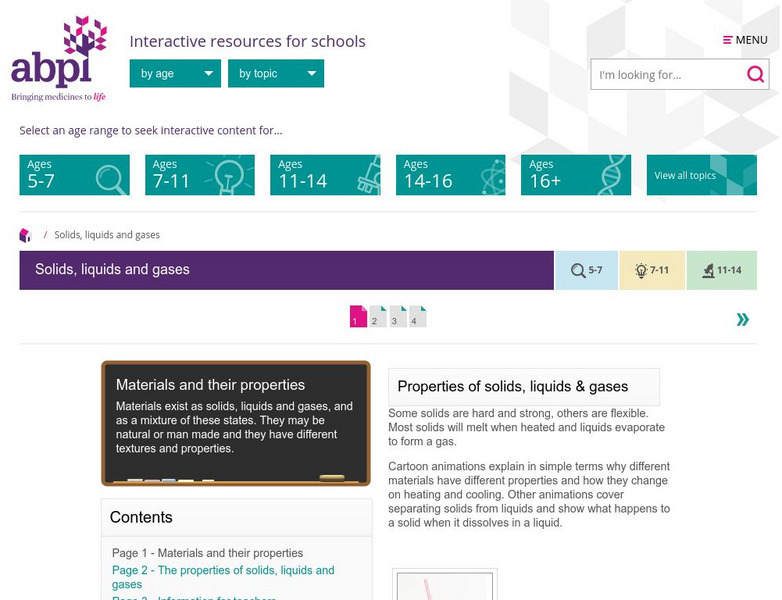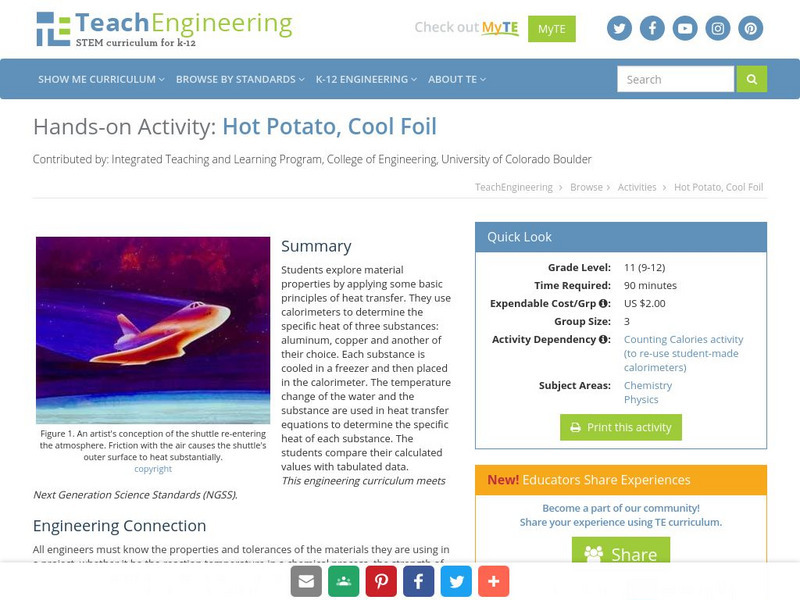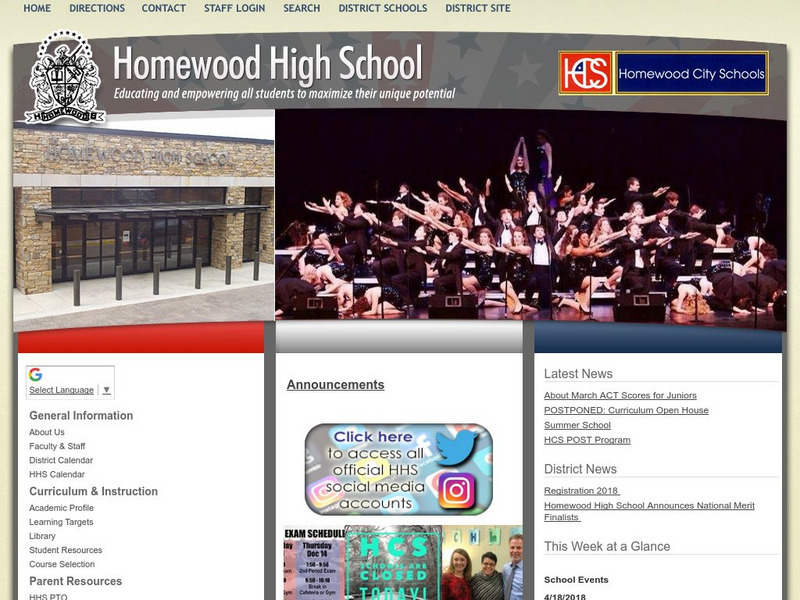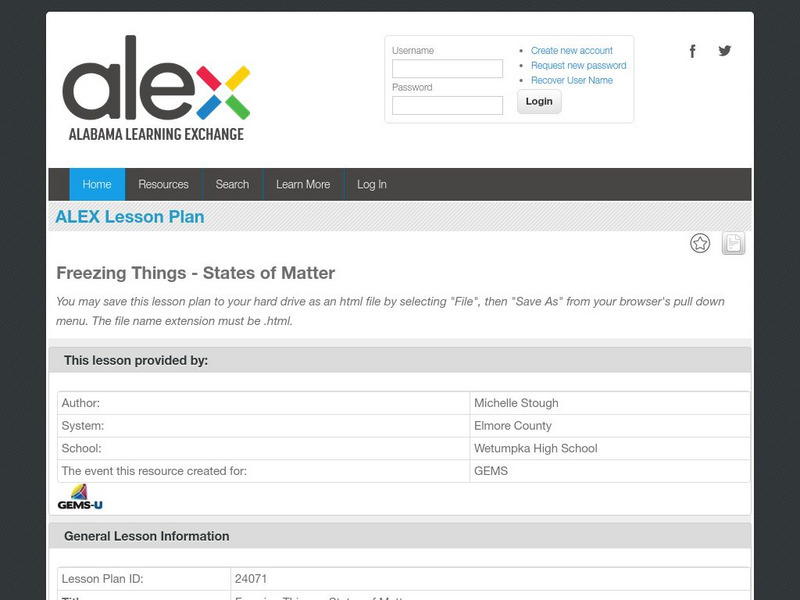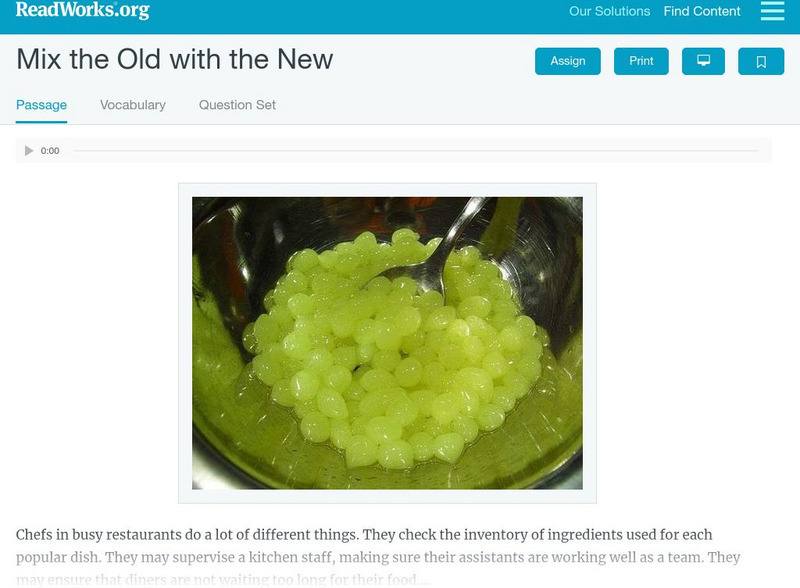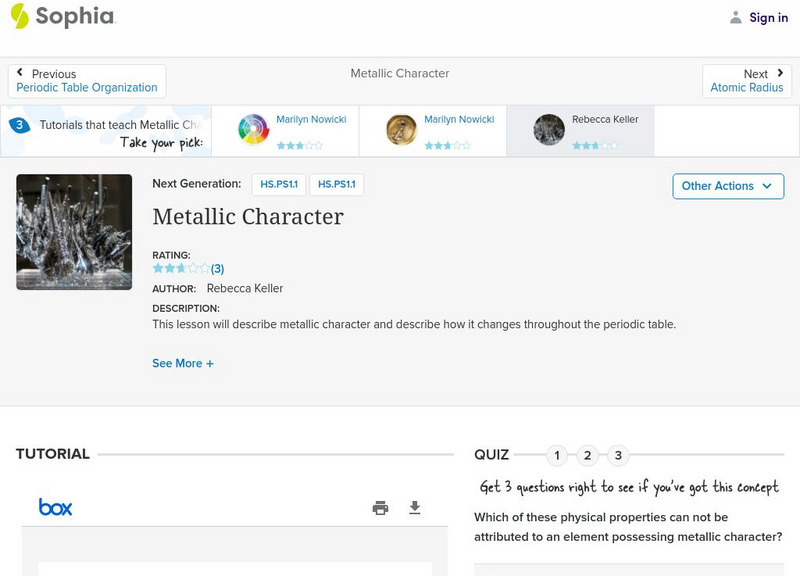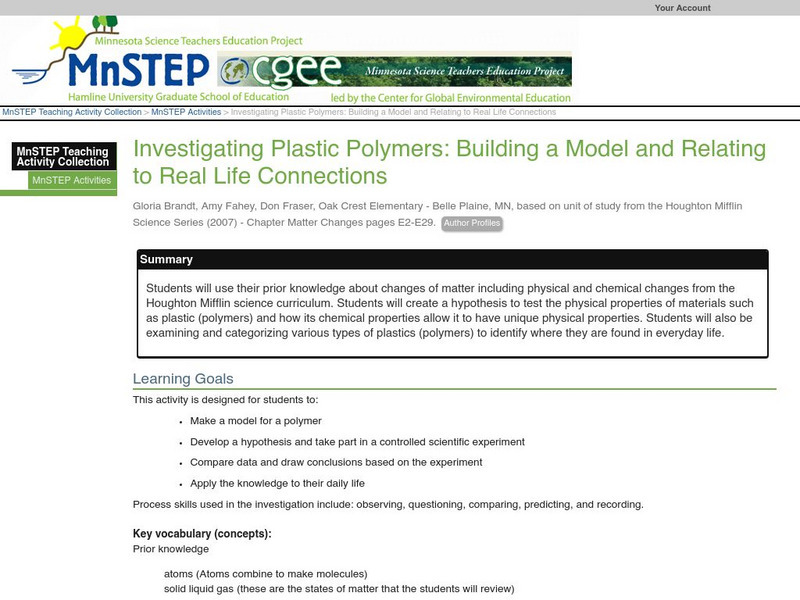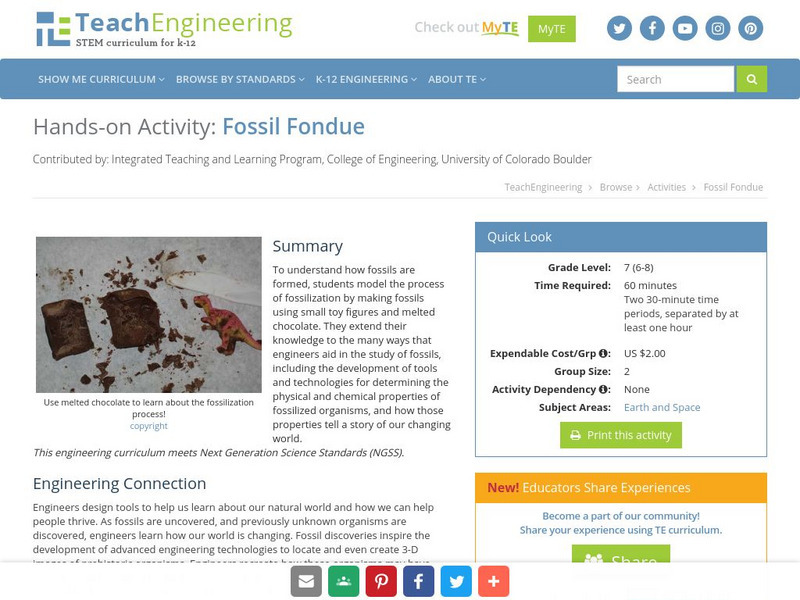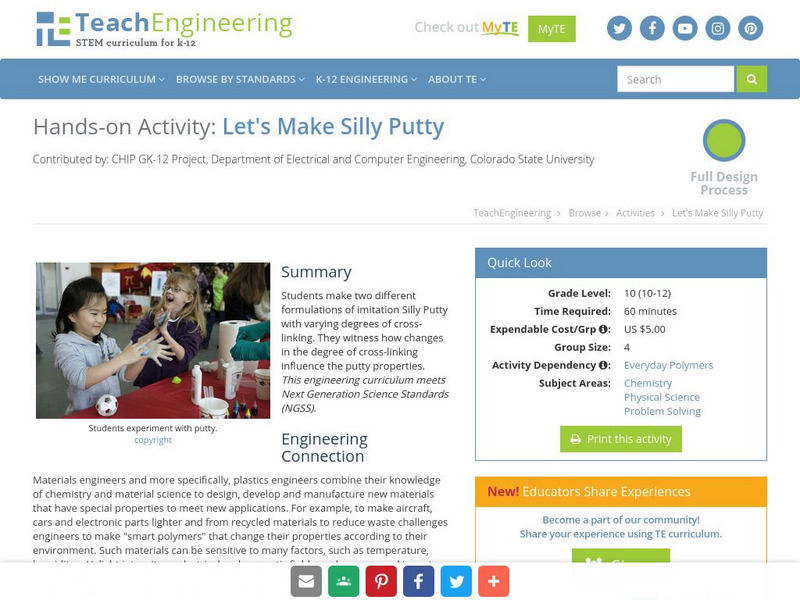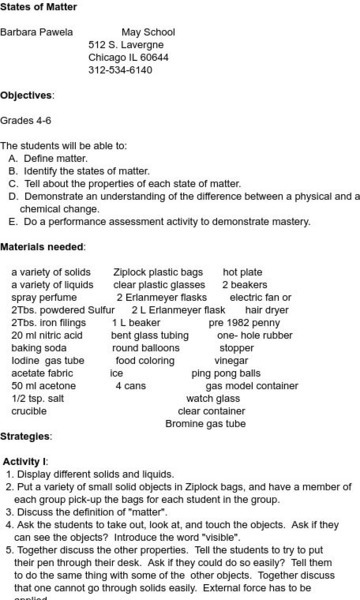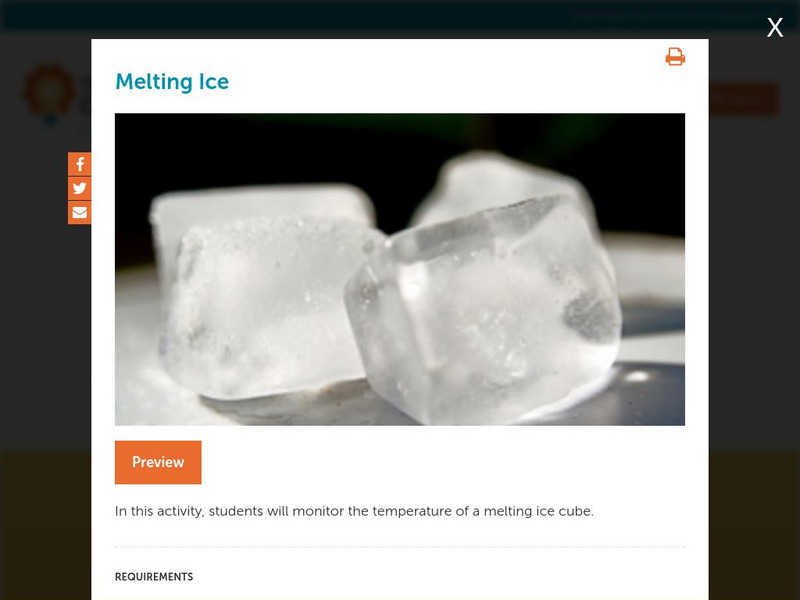Upper Canada District School Board
Tom Stretton's Advanced Placement Chemistry: Liquids and Solids
Take on this self-guided advanced level e-text, and learn about the chemical and physical structure of liquids and solids.
Other
Classifying Matter and Changes in Matter
Learn to identify changes in matter and explain what happens as matter changes. The lesson is supplemented with several experiments to reinforce key concepts.
Science and Mathematics Initiative for Learning Enhancement (SMILE)
Smile: Physical and Chemical Changes
This lesson plan focuses on the difference between physical and chemical changes of matter.
Thomas Jefferson National Accelerator Facility
Jefferson Lab: Reading Passage: Properties and Changes
Read and fill in the blanks of this passage properties and changes. Each blank has a dropdown menu with choices. When you finish, click CHECK MY ANSWERS. If you pick a wrong answer, the right answer will be displayed along with your choice.
TeachEngineering
Teach Engineering: Food Packaging
This lesson focuses on how food packages are designed and made. Students will learn three of the main functions of a food package. They will learn what is necessary of the design and materials of a package to keep food clean, protect or...
eSchool Today
E School Today: What Is Matter
Learn about matter, its three states, changes of state, how matter behaves, and physical and chemical changes in matter.
The Association of the British Pharmaceutical Industry
Abpi: Solids, Liquids, and Gases
Students learn about solids, liquids, and gases in this interactive slide show. Animated cartoon characters explain concepts having to do with properties of matter. A self-checking quiz follows the lesson.
TeachEngineering
Teach Engineering: Hot Potato, Cool Foil
Students explore material properties by applying some basic principles of heat transfer. They use calorimeters to determine the specific heat of three substances: aluminum, copper and another of their choice. Each substance is cooled in...
Other
The Science House: Dancing Spaghetti
The chemical change of matter is illustrated in this lab experiment when spaghetti is placed in a solution of baking soda and vinegar. Watch the spaghetti rise to the surface and sink again once the gas is released.
Other
Homewood City Schools: Classification of Matter
This Homewood City Schools site has an outline form and contains lots of information about the classification and composition of matter. Some of the topics covered are matter and temperature, changes in state, composition of matter, and...
Alabama Learning Exchange
Alex: Freezing Things: States of Matter
The class will go back over the Power Point presentation on chemical and physical properties. The teacher will then conduct numerous liquid nitrogen demos. This activity is used early in the Chemistry course. The students love it. This...
Other
King's Centre for Visualization in Science: Scientific Models
A series of interactive applets use scientific models to teach some basic concepts of matter, including states of matter and physical and chemical changes.
Read Works
Read Works: Mix the Old With the New
[Free Registration/Login Required] An informational text about how cooking causes changes in matter. A question sheet is available to help students build skills in reading comprehension.
Sophia Learning
Sophia: Metallic Character
A slide show presentation describes the metallic character of elements, and explains how that changes throughout the periodic table.
Science Education Resource Center at Carleton College
Serc: Investigating Plastic Polymers: Building a Model
Students will use their prior knowledge about changes of matter including physical and chemical changes from the Houghton Mifflin science curriculum. Students will create a hypothesis to test the physical properties of materials such as...
TeachEngineering
Teach Engineering: Fossil Fondue
To understand how fossils are formed, students model the process of fossilization by making fossils using small toy figures and melted chocolate. They extend their knowledge to the many ways that engineers aid in the study of fossils,...
Other
The Science House: Invisible Ink
Guidelines for a simple lab demonstration using phenolphthalein, a chemical that changes color depending on whether it is in the presence of an acid or base.
TeachEngineering
Teach Engineering: Common and Natural Logarithms and Solving Equations
Students continue an examination of logarithms in the Research and Revise stage by studying two types of logarithms--common logarithms and natural logarithm. In this study, they take notes about the two special types of logarithms, why...
TeachEngineering
Teach Engineering: Surface Tension
Surface tension accounts for many of the interesting properties we associate with water. By learning about surface tension and adhesive forces, students learn why liquid jets of water break into droplets rather than staying in a...
TeachEngineering
Teach Engineering: Let's Make Silly Putty
Students make two different formulations of imitation Silly Putty with varying degrees of cross-linking. They witness how changes in the degree of cross-linking influence the putty properties.
Science and Mathematics Initiative for Learning Enhancement (SMILE)
Smile: States of Matter
A comprehensive lesson plan site that contains a number of activities to aid in teaching about the states and properties of matter and the difference between a physical and chemical change.
Science Education Resource Center at Carleton College
Serc: Polymers & Plastics: Classification & Models
Students will use their prior knowledge about changes of matter including physical and chemical changes to examine and categorize various types of plastics (polymers). They will identify how their chemical properties allow them to have...
Other
The Science House: Combustion
In this experiment, students will observe that the weight of the product of combustion is greater than that of the starting material. Teacher's notes address the key concepts of this experiment.
Concord Consortium
Concord Consortium: Stem Resources: Melting Ice
Using temperature probes, students will monitor the temperature of melting ice cubes in different situations. This lab activity, allows students to view the procedure and answer questions online that can be saved and evaluated by the...
